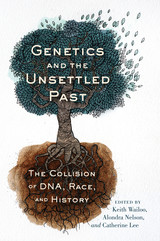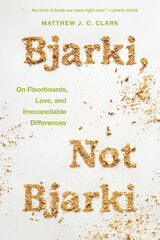
Our genetic markers have come to be regarded as portals to the past. Analysis of these markers is increasingly used to tell the story of human migration; to investigate and judge issues of social membership and kinship; to rewrite history and collective memory; to right past wrongs and to arbitrate legal claims and human rights controversies; and to open new thinking about health and well-being. At the same time, in many societies genetic evidence is being called upon to perform a kind of racially charged cultural work: to repair the racial past and to transform scholarly and popular opinion about the “nature” of identity in the present.
Genetics and the Unsettled Past considers the alignment of genetic science with commercial genealogy, with legal and forensic developments, and with pharmaceutical innovation to examine how these trends lend renewed authority to biological understandings of race and history.
This unique collection brings together scholars from a wide range of disciplines—biology, history, cultural studies, law, medicine, anthropology, ethnic studies, sociology—to explore the emerging and often contested connections among race, DNA, and history. Written for a general audience, the book’s essays touch upon a variety of topics, including the rise and implications of DNA in genealogy, law, and other fields; the cultural and political uses and misuses of genetic information; the way in which DNA testing is reshaping understandings of group identity for French Canadians, Native Americans, South Africans, and many others within and across cultural and national boundaries; and the sweeping implications of genetics for society today.


Police put Eric Garner in a fatal chokehold for selling cigarettes on a New York City street corner. George Floyd was killed by police outside a store in Minneapolis known as “the best place to buy menthols.” Black smokers overwhelmingly prefer menthol brands such as Kool, Salem, and Newport. All of this is no coincidence. The disproportionate Black deaths and cries of “I can’t breathe” that ring out in our era—because of police violence, COVID-19, or menthol smoking—are intimately connected to a post-1960s history of race and exploitation.
In Pushing Cool, Keith Wailoo tells the intricate and poignant story of menthol cigarettes for the first time. He pulls back the curtain to reveal the hidden persuaders who shaped menthol buying habits and racial markets across America: the world of tobacco marketers, consultants, psychologists, and social scientists, as well as Black lawmakers and civic groups including the NAACP. Today most Black smokers buy menthols, and calls to prohibit their circulation hinge on a history of the industry’s targeted racial marketing. In 2009, when Congress banned flavored cigarettes as criminal enticements to encourage youth smoking, menthol cigarettes were also slated to be banned. Through a detailed study of internal tobacco industry documents, Wailoo exposes why they weren’t and how they remain so popular with Black smokers.

—Paul Starr, excerpted from his conclusion in "Transforming American Medicine: A Twenty-Year Retrospective on The Social Transformation of American Medicine"
Paul Starr’s Controversial Vision
In the early 1980s, as America stood at a crossroads—between New Deal liberalism and the conservatism of "the Reagan Revolution"—so too did American medicine and health care. Engaging this critical moment, Paul Starr’s The Social Transformation of American Medicine stimulated scholars across the disciplines to take stock of medicine’s historical and future trajectories. Starr’s analysis of American health care and medicine, undertaken in the context of broad contemporary societal, political, and cultural forces, earned him the Pulitzer and Bancroft Prizes, as well as garnering enduring public acclaim. Indeed, twenty years after its publication, The Social Transformation of American Medicine is now a standard in disciplines from health law to political science and history.
Despite its undeniable import, Starr’s book still provokes argument and strong reaction on all sides, and the question that has puzzled readers since the grand synthesis appeared remains: whether to praise or to criticize it. According to historian Keith Wailoo, health lawyer Timothy Stoltzfus Jost, and political economist Mark Schlesinger, coeditors of "Transforming American Medicine: A Twenty-Year Retrospective on The Social Transformation of American Medicine," a new special double issue of the Journal of Health Politics, Policy and Law, the answer appears to be to do both.
How Does the Vision Hold Up?
Rife with criticism, praise, and in-depth analysis of Starr’s work, this lengthy special issue brings together scholars from many disciplines to offer a comprehensive assessment of the life, the times, the promise, the problems, and the paradoxes of The Social Transformation of American Medicine. Contributors think critically about the problem of the grand narrative, about why doctors and health lawyers loved the book, about why historians reacted to it with ambivalence, about why its themes resonated as they did, and finally about how the political and policy landscape of health care has shifted in the last two decades. Additionally, the issue includes an extensive précis of salient parts of The Social Transformation of American Medicine and concludes with a contentious essay in which Starr himself responds to some of the criticism leveled at him in the preceding pages.
With American medicine and health care now at another crossroads—a relentless rise in medical spending on one side, and a persistent sense that Americans are not getting good value for their health care dollar on the other—the issues that Starr originally highlighted (the rise of medical authority and the elaborate dance among doctors, the state, and the corporation) are still of vital importance. "Transforming American Medicine: A Twenty-Year Retrospective on The Social Transformation of American Medicine" vigorously continues the discussion of medicine’s past, present, and future that Starr’s book set in motion.
Contributors. Gloria J. Bazzoli, Lawrence P. Casalino, Stefan Gildemeiste
READERS
Browse our collection.
PUBLISHERS
See BiblioVault's publisher services.
STUDENT SERVICES
Files for college accessibility offices.
UChicago Accessibility Resources
home | accessibility | search | about | contact us
BiblioVault ® 2001 - 2024
The University of Chicago Press









